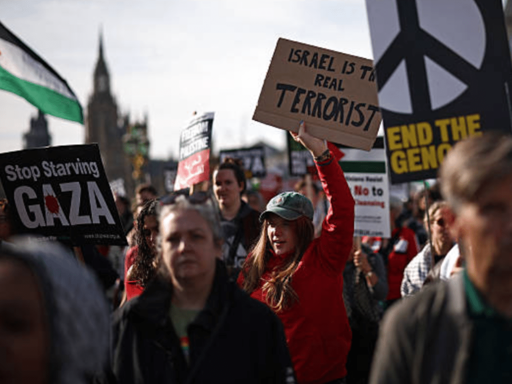Yesterday, 15 October, court hearings began for the roughly 2,000 people who stand accused of showing support for Palestine Action. The government proscribed the campaign group as a terrorist organisation back in July. The move came after Palestine Action sprayed paint at two military planes in RAF Brize Norton, among other similar demonstrations.
Under UK law, displaying an item showing support for a proscribed organisation is considered a low-level terrorism offence, which can be tried in a Magistrates Court. It carries a sentence of up to six months in prison. So far, 170 people have been charged.
Police have arrested over 2,100 people for their support of Palestine Action since July. Most of them held simple placards reading “I oppose genocide. I support Palestine Action”. Many of the protesters arrested were pensioners.
‘Limitations on fundamental rights’
The Council of Europe commissioner for human rights, Michael O’Flaherty, has already urged the UK to review its protest laws. He criticised both the Palestine Action ban (and subsequent mass arrests) and other recent draconian anti-protest measures.
In September, O’Flaherty wrote in a letter to the home secretary:
I observe that large numbers of arrests have reportedly been made for displaying placards or banners expressing solidarity with the organisation or disagreement with the government’s decision to proscribe it.
I am aware that ‘support’ for a proscribed group is an offence under the Terrorism Act 2000. In this regard I recall that domestic legislation designed to counter ‘terrorism’ or ‘violent extremism’ must not impose any limitations on fundamental rights and freedoms, including the right to freedom of peaceful assembly, that are not strictly necessary for the protection of national security and the rights and freedoms of others.
He went on:
Changes following the adoption of the Police Crime, Sentencing and Courts Act 2022 and the Public Order Act 2023 continue to allow authorities to impose excessive limits on freedom of assembly and expression, and risk overpolicing.
Following recent court findings that regulations defining serious disruption as ‘more than minor’ disruption are unlawful, I encourage your government to ensure that any arrests or convictions based on these regulations are subject to review.
Furthermore, I would recommend that a comprehensive review of the compliance of the current legislation on the policing of protests with the United Kingdom’s human rights obligations be undertaken.
Rushed trials, wasted time
O’Flaherty wasn’t alone among official critics of the proscription, either. Police Scotland found that Palestine Action’s activities fell far below the level necessary to be considered terrorism. Green Party leader Zack Polanski has called on the government to reverse the proscription. Hell, even MI6 insiders have said that senior figures within the organisation consider it a “distraction from the battle against real terrorist threat”.
Now, UK courts are seeing the sheer extent of the prescription’s folly playing out in real time. Currently, magistrates are planning to try the 2,000 defendants en-masse, across 400 trials. This will use up at least 200 days of the court’s time.
The court’s plan to try five people at a time, at a rate of two trials a day, raises serious questions of fairness. A lawyer for the defence stated that this timetable wouldn’t allow each defendant adequate time to present their case.
72-year-old defendant Deborah Wilde called out the rushed nature of the trials in court:
I don’t think I can get a fair trial on the [time] limit that you have allocated to me. I would like to seek leave to appeal.
District judge Michael Snow rebuffed her:
I’m satisfied that the time is sufficient. I’m not allowing more time for the trial. Your only remedy is the High Court.
As of yesterday, 28 of the defendants had plead ‘not guilty’. Most of them didn’t have a lawyer, and lacked clarity about what was happening to them. Many spoke about their duty to protest genocide, and their objections to the Palestine Action ban.
Coercing silence
However, this deplorable situation gets worse still. Prosecutors acknowledged that it would be difficult to set actual trial dates because of the ongoing court case challenging the proscription of Palestine Action.
Magistrates have set the provisional trial dates for March 2026. However, the unknown length and outcome of the legal challenge could push that back much later in the year.
If the prescription is overturned, the charges against Palestine Action’s supporters will most likely be dropped. However, if the ban remains, the cases of the 2,000 in court still promise to be fraught.
As such, three lead cases which began back in September are being used as a testing ground of sorts to answer these legal quandaries. If any of these cases wind up going to the Supreme Court, the trials could be pushed back as far as 2027.
Setting dates for 400 trials and thousands of defendants is already a logistical nightmare. Having to reschedule them, potentially multiple times, would be a colossal waste of the court’s time, the defendants’ time, and public money.
An International Federation for Human Rights study showed that Western governments have “weaponised” counter-terrorism legislation to silence support for Palestine. Coupled with the UK’s vicious anti-protest laws, you have a recipe for the exact kind of farce we’re now seeing.
We get it, if we were complicit in genocide, we wouldn’t want anybody talking about it either. The UK government seems to think it can just arrest its opponents into silence. This is a cowardly intimidation tactic, and what’s more, it isn’t working – the 2,000 people standing up in court over the coming years are testament to that fact.
Featured image via the Canary
From Canary via this RSS feed


